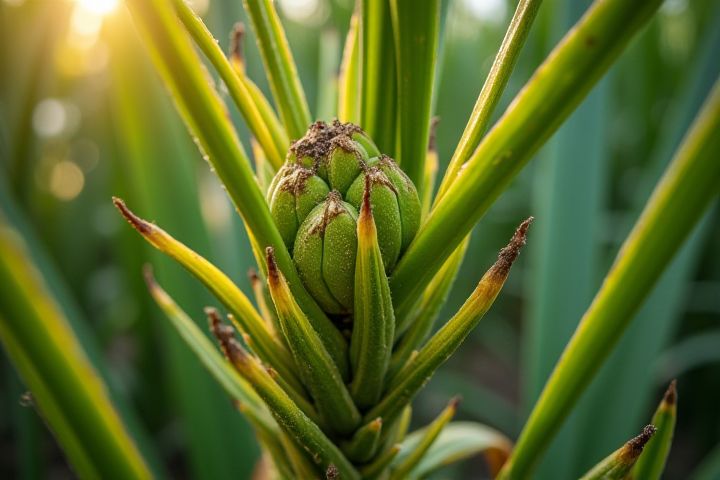
The oil palm industry in Nigeria is a crucial sector that significantly contributes to the nation's economy, employing millions and generating substantial foreign exchange. Nigeria is one of the largest producers of palm oil in Africa, with a rich history rooted in traditional cultivation methods. The country's tropical climate and fertile land provide ideal conditions for the growth of oil palm trees, making it a prime location for both smallholder farms and large plantations. As global demand for palm oil continues to rise, there is an increasing focus on sustainable practices to mitigate environmental impacts and promote conservation of biodiversity. Investing in the oil palm industry can enhance food security, create job opportunities, and bolster rural development in Nigeria.
Economic significance
The oil palm industry in Nigeria is a crucial driver of economic growth, generating significant revenue and employment opportunities. With the country being one of the largest producers of palm oil in the world, it contributes substantially to the agricultural sector and foreign exchange earnings. The sector supports smallholder farmers, improving their livelihoods and fostering rural development through increased income and investment in local infrastructure. Moreover, the government's initiatives to enhance processing facilities and promote sustainable practices aim to position Nigeria as a leader in the global palm oil market, further bolstering its economic significance.
Employment generation
The oil palm industry in Nigeria plays a crucial role in employment generation, providing livelihoods for millions of people in both rural and urban areas. By cultivating oil palm plantations, farmers and laborers benefit from job opportunities in planting, harvesting, processing, and distribution. This sector not only supports local economies but also encourages small and medium-sized enterprises, contributing to national economic growth. As the demand for palm oil increases globally, investing in this industry can further enhance job creation and improve socio-economic conditions in Nigeria.
Land use and deforestation
The oil palm industry in Nigeria plays a significant role in the economy while contributing to critical environmental challenges, particularly land use changes and deforestation. Expanding oil palm plantations often involves clearing vast areas of tropical rainforest, leading to habitat loss for countless species and impacting biodiversity. You might be interested to know that this deforestation exacerbates climate change by releasing stored carbon dioxide into the atmosphere. Sustainable practices and responsible land management are essential to balance agricultural productivity with environmental preservation in this vital sector.
Government policies
The oil palm industry in Nigeria is significantly influenced by government policies aimed at boosting local production and reducing import dependency. Various initiatives, such as the Nigerian Oil Palm Industry Development Bill, are designed to support farmers through subsidies and access to better seedlings. Regulatory frameworks encourage sustainable farming practices, enhancing productivity while minimizing environmental impacts. As a result, Nigeria is positioning itself to become a leading exporter of palm oil in the global market, creating opportunities for economic growth and job creation.
Challenges with sustainability
The oil palm industry in Nigeria faces significant sustainability challenges, including deforestation, biodiversity loss, and land conflicts. Unsustainable farming practices contribute to soil degradation and water pollution, further exacerbating environmental issues. You may encounter concerns regarding the displacement of local communities and the adverse effects on their livelihoods due to the expansion of palm plantations. Efforts to promote sustainable practices, such as certification schemes and agroforestry, are essential for the industry's long-term viability and the protection of ecosystems.
Export market potential
The oil palm industry in Nigeria is increasingly targeting the export market, driven by the global demand for palm oil as a versatile ingredient in food, cosmetics, and biofuels. Nigeria ranks among the top oil palm producers in Africa, yet it has significant untapped potential to increase its export capacity. By improving agricultural practices and investing in processing facilities, the country can enhance the quality and quantity of palm oil available for international trade. Your involvement in supporting sustainable palm oil production can contribute to the industry's growth while promoting eco-friendly practices.
Environmental impact
The oil palm industry in Nigeria significantly contributes to the country's economy but poses critical environmental challenges. Deforestation and habitat destruction arise from extensive palm cultivation, threatening biodiversity and altering ecosystems. Soil degradation and water pollution from agricultural runoff further exacerbate these issues, impacting local communities and wildlife. Sustainable practices, such as agroforestry and organic cultivation, are essential tools that can minimize your ecological footprint while ensuring economic growth.
Technological advancements
The oil palm industry in Nigeria is increasingly embracing technological advancements to enhance productivity and sustainability. Precision agriculture techniques, such as drone surveillance and satellite imaging, are being utilized to monitor crop health and optimize resource allocation. Furthermore, innovations in processing equipment and biotechnology are improving oil extraction efficiency while reducing waste. By adopting these state-of-the-art technologies, you can contribute to a more sustainable and profitable oil palm sector in Nigeria.
Regulatory compliance
The oil palm industry in Nigeria is heavily influenced by regulatory compliance, which aims to enhance sustainability and promote eco-friendly practices. Key regulations address environmental protection, labor rights, and the fair trade of palm oil, ensuring that production methods adhere to both national and international standards. Various governmental and non-governmental organizations actively monitor compliance, providing guidelines that help stakeholders navigate complex legal requirements. As a stakeholder in this sector, understanding these regulations is vital for fostering responsible production and securing market access for Nigerian palm oil globally.
Smallholder involvement
The oil palm industry in Nigeria significantly relies on smallholder farmers who contribute approximately 70% of national production. These smallholders typically manage less than two hectares each, employing traditional farming methods that have been passed down through generations. Government initiatives and private sector partnerships aim to enhance productivity by providing access to better seedlings, modern agricultural practices, and financial support. This focus on smallholder involvement not only boosts local economies but also promotes sustainable farming practices, improving the livelihoods of rural communities.
